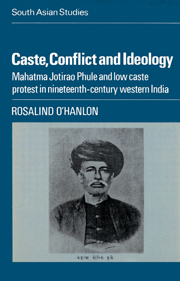 Caste, Conflict and Ideology
Caste, Conflict and Ideology Book contents
- Frontmatter
- Contents
- Acknowledgements
- Notes on translations and area under study, with map
- Part 1 Introduction
- Part 2 Religion and society under early British rule
- 2 From warrior traditions to nineteenth-century politics: structure, ideology, and identity in the Maratha-kunbi caste complex
- 3 The crisis of cultural legitimacy: missionaries, reformers, and Hindu society in the mid-nineteenth century
- 4 The growth of religious reform opinion in western India
- Part 3 Jotirao Phule and his circle: the emergence of a distinctive radical voice
- Part 4 The creation of a lower caste identity in history and popular culture, 1869–73
- Part 5 The lower caste community in contemporary society
- Part 6 Ideology and the non-Brahman movement in the 1880s
- Bibliographic note
- Bibliography
- Glossary
- Index
3 - The crisis of cultural legitimacy: missionaries, reformers, and Hindu society in the mid-nineteenth century
from Part 2 - Religion and society under early British rule
Published online by Cambridge University Press: 14 October 2009
- Frontmatter
- Contents
- Acknowledgements
- Notes on translations and area under study, with map
- Part 1 Introduction
- Part 2 Religion and society under early British rule
- 2 From warrior traditions to nineteenth-century politics: structure, ideology, and identity in the Maratha-kunbi caste complex
- 3 The crisis of cultural legitimacy: missionaries, reformers, and Hindu society in the mid-nineteenth century
- 4 The growth of religious reform opinion in western India
- Part 3 Jotirao Phule and his circle: the emergence of a distinctive radical voice
- Part 4 The creation of a lower caste identity in history and popular culture, 1869–73
- Part 5 The lower caste community in contemporary society
- Part 6 Ideology and the non-Brahman movement in the 1880s
- Bibliographic note
- Bibliography
- Glossary
- Index
Summary
Introduction
It was not only from the processes described in chapter 2 that polemicists, such as Jotirao Phule, were to draw their material. They also made use of a wide variety of arguments and ideas associated with protestant missionaries, European radicals and free-thinkers, as well as other Indian reformers themselves. This chapter has two aims. The first is to examine the structure and content of missionary propaganda, and other ideas from Europe, that were in circulation amongst the small circles of the western-educated in the cities and smaller provincial towns of western Maharashtra. The second is to argue that these ideas were of enormous importance in shaping reformist opinion. However, the connection between them requires very careful elucidation, both in terms of the groups that were actually influenced in this way, and of the interaction of ideas about Hindu society and British rule. This analysis will form the prelude to the next chapter which examines the ideas of prominent Hindu reformers in western India, and of the religious milieu in which Phule's own ideas were formed.
The 1830s and 1840s saw in western India the creation of a new periodical press, both in English and in Marathi. The press was aimed largely at the small groups of the western-educated. It was the creation in part of protestant missionaries, and in part of prominent and energetic Hindus themselves, who were anxious to create a new intellectual community of the western-educated, and to debate amongst themselves the momentous issues of social change, political tutelage, and scientific advances, that were associated with British rule.
- Type
- Chapter
- Information
- Caste, Conflict and IdeologyMahatma Jotirao Phule and Low Caste Protest in Nineteenth-Century Western India, pp. 50 - 87Publisher: Cambridge University PressPrint publication year: 1985


